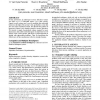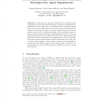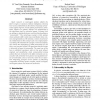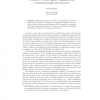MAAMAW
1999
Springer
14 years 7 months ago
1999
Springer
Cooperation plays a fundamental role in multi-agent systems in which individual agents must interact for the overall system to function effectively. However, cooperation inherently...
AGENTS
2000
Springer
14 years 7 months ago
2000
Springer
This paper describes and evaluates three methods for coordinating multiple agents. These agents interact in two ways. First, they are able to work together to achieve a common poo...
ATAL
2003
Springer
14 years 8 months ago
2003
Springer
System performance in multi-agent resource allocation systems can often improve if individual agents reduce their activity. Agents in such systems need a way to modulate their ind...
IAT
2003
IEEE
14 years 8 months ago
2003
IEEE
This paper defines an approach to simulation of natural systems, inspired by complex systems theory. A complex natural system is modeled as a multi-agent simulation system, agents...
PROMAS
2004
Springer
14 years 8 months ago
2004
Springer
In this paper, we propose a framework for modelling agent organizations, Omni, that allows the balance of global organizational requirements with the autonomy of individual agents....
ATAL
2004
Springer
14 years 8 months ago
2004
Springer
Much research in multi-agent systems reflects the field’s origins in classical artificial intelligence, showing how various refinements to the internal reasoning of individual a...
IAT
2005
IEEE
14 years 8 months ago
2005
IEEE
Multiagent Bayesian networks (MABNs) are a powerful new framework for uncertainty management in a distributed environment. In a MABN, a collective joint probability distribution i...
INFOSCALE
2006
ACM
14 years 9 months ago
2006
ACM
This research addresses the formation of new concepts and their corresponding ontology in a multiagent system where individual autonomous agents try to learn new concepts by consu...
ESAW
2009
Springer
14 years 9 months ago
2009
Springer
Multi-agent systems are viewed as consisting of individual agents whose behaviors are regulated by organization artifacts. This abstract presents a programming language, which is d...
ATAL
2009
Springer
14 years 9 months ago
2009
Springer
It is often the case that agents within a system have distinct types of knowledge. Furthermore, whilst common goals may be agreed upon, the particular representations of the indiv...




